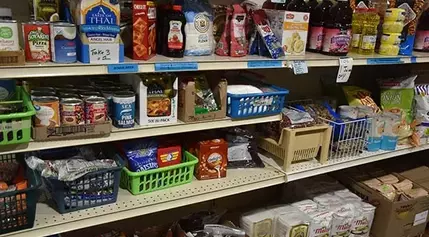News

Marshalltown's Emergency Food Box Faces Unprecedented Demand as Families Struggle with Rising Costs
The Emergency Food Box in Marshalltown, Iowa, has seen a steady increase in the number of families seeking assistance, with over 500 households turning to the nonprofit each month for help. This surge in demand highlights the growing financial strain faced by many in the community, as the rising costs of rent, utilities, gas, groceries, and household supplies take a toll on household budgets.Providing a Lifeline to Families in Need
Unprecedented Demand for Food Assistance
The Emergency Food Box has experienced a significant uptick in the number of families it serves, with the monthly average increasing from 200 households in 2020-2022 to over 500 in the last five months. Cindy Staron, the co-chair of operations, attributes this surge to a variety of factors, including the closure of manufacturing plants in nearby cities, the rising cost of living, and unexpected medical expenses that can quickly deplete a family's resources.The food bank's shelves are constantly being replenished, as the donated goods are quickly distributed to those in need. A recent donation of 4,000 pounds of food in August was completely gone by October, underscoring the scale of the challenge the organization faces in keeping up with the growing demand.Addressing the Root Causes of Food Insecurity
Staron believes that the increase in demand for the Emergency Food Box's services is a symptom of broader economic challenges facing the community. The rising cost of rent, utilities, and other essential expenses has left many families struggling to make ends meet, forcing them to turn to the food bank for assistance.The organization has also seen a rise in the number of households combining living arrangements, as families seek to share resources and reduce their expenses. Staron notes that this trend is a clear indication of the financial strain many are facing, as they are forced to make difficult choices between paying for necessities like food and other basic needs.Adapting to Meet the Growing Need
Despite the challenges, the Emergency Food Box has remained steadfast in its mission to provide food assistance to those in need. The organization relies on a dedicated team of 80 to 90 volunteers who work tirelessly to ensure that families receive the support they require.The food bank has also forged partnerships with local businesses and organizations, such as the Food Bank of Iowa, to supplement its resources. These collaborations have allowed the Emergency Food Box to access additional food supplies and stretch its limited budget to meet the growing demand.Staron emphasizes the importance of the community's financial and food donations, which have been crucial in enabling the organization to continue its work. She acknowledges that the situation is fluid, and the team is constantly monitoring the evolving needs of the families they serve, adjusting their strategies and resources accordingly.Fostering a Sense of Community and Resilience
Beyond the practical aspects of providing food assistance, the Emergency Food Box also plays a vital role in fostering a sense of community and resilience among the families it serves. Staron notes that many of the clients they see are facing difficult circumstances, and the support they receive from the organization can be a lifeline during their time of need.The food bank's volunteers work tirelessly to ensure that each family is treated with dignity and respect, providing not only food but also a listening ear and a compassionate presence. This holistic approach helps to build trust and strengthen the bonds within the community, empowering families to navigate their challenges and work towards a more stable future.As the demand for the Emergency Food Box's services continues to grow, the organization remains committed to its mission of supporting those in need and fostering a more resilient and equitable community. Through its tireless efforts and the generosity of the Marshalltown community, the food bank continues to be a beacon of hope for those facing the challenges of food insecurity.

